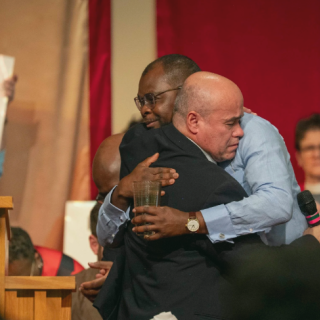Advertisement
Jadarrius Rose’s semi was traveling through the middle of Ohio near Circleville on July 4th when a state trooper tried to pull him over for missing a mud flap on one of his tires on a perfectly sunny day.
State troopers often pull over semis for safety reasons, mostly to check if their load is under the legal weight limit. Yet whether 23-year-old Rose, an African American, was profiled may never be revealed.
Why Rose did not at once pull over is a good question. But being profiled causes some to panic. Rose eventually did stop, got out of his truck where state troopers urged him to surrender. Instead, a Circleville police officer and his confused dog showed up – the German Shepard first looked to attack a state trooper, but then mauled Rose. The Circleville officer was fired pending his union’s appeal. Yet Rose, after first going to the hospital, was the individual who ended up behind bars that day.
State troopers should have never pulled over Rose in the first place. They did appear to attempt to de-escalate the situation, yelling at the Circleville officer, Ryan Speakman, to not sic his German Shepard on Rose. Speakman is alleged to have told other officers he believed the attack was “justified.”
“It’s sad and not a surprise that Ohio continually makes national news for brutal policing,” says Emily Cole, executive director of Ohio Families Unite for Political Action and Change (OFUPAC). The lobbyist arm of Ohio Families Unite Against Police Brutality, which was founded by Sabrina Jordan of Dayton who lost her son to police brutality in 2017
Jordan’s nonprofit represents 700 Ohio families who have also lost a loved one since the turn of the century to police brutality.
Like Jadarrius Rose, Cynthia Brown’s nephew, Kareem Ali Nadir Jones, was approached by Columbus police in 2017 for no good reason. The situation spiraled out of control, and Jones was shot and killed by police.
Brown is a spokesperson for the Ohio Coalition to End Qualified Immunity, which is seeking to end Qualified Immunity for law enforcement through a citizen-led initiative to change Ohio’s constitution. Qualified Immunity makes it makes it nearly impossible to sue law enforcement for brutality, which is why Ohio’s Secretary of State and Republican Frank LaRose is urging a “yes” vote on Issue 1 so to preserve it.
Both Brown and Cole have also been pressuring the Ohio legislature to implement mandatory and yearly “de-escalation training.” Which would help law enforcement to remain calm, give space, and communicate first, especially when facing people experiencing a mental health crisis.
What doesn’t make any sense is there’s no uniform policy across the state mandating de-escalation training once an officer graduates from their initial training. Instead, it is up to each department to initiate such training, and activists say many do not.
“Some departments have that as part of their cadet academy, but it’s not in the Ohio Revised Code that it’s required,” said Cole. “Mandatory de-escalation training is not in the ORC for police. It is mandatory for mental health professionals and for a certain number of people in the school system.”
Brown says if “there had been effective de-escalation training programs in place in Columbus, Kareem Ali Nadir Jones would almost certainly be alive today.”
“Currently, the state of Ohio offers de-escalation training to officers only as it pertains to handling situations involving autistic individuals,” says Brown. “De-escalation training should be rooted in evidence-based methodologies, prioritizing empathy, communication, and understanding. A minimum of 40 hours should be allocated for initial training, supplemented by annual refresher courses to ensure continued competency.”
Indeed, a quick look at PoliceTraining.net for Ohio shows not one class during the upcoming 12 months offering “de-escalation” techniques and practices. There are, however, plenty of seminars for “Advanced Traffic Stops” and “Mastering Search and Seizure,” as well as “Advanced Interrogation.”
Cole says of late she’s become concerned that lobbying for de-escalation training at the Statehouse may actually further something the 700 families who have lost a loved one to Ohio law enforcement don’t want.
“There’s been support [for de-escalation training], but unfortunately some members of the legislature have used that as a reason for why we need an ‘Ohio Cop City’ – a training center for tactical maneuvers,” she said.
Brown says since George Floyd’s murder at the hands of Minneapolis police, Gov. Mike DeWine has allocated several hundred million to police to further recruitment and “resilience recovery,” which essentially is training for officers to care for their own mental health (and very much needed).
But impacted families, says Brown, have been asking for “mandatory de-escalation training to prevent loss of life” long before George Floyd.
“The bottom line is, those who want to ban books, cut the budget for the poor, limit what teachers can teach regarding black history, also refuse to make de-escalation training for officers mandatory,” says Brown.



